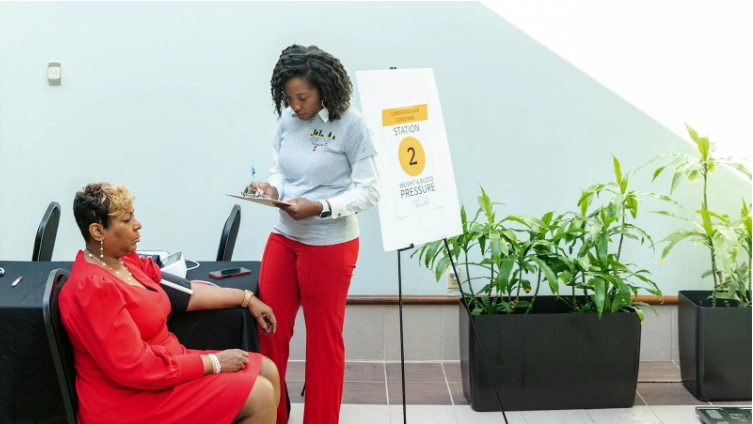Cardiovascular disease (CVD) remains the leading cause of death in Baltimore, particularly among Black residents, where hypertension and heart-related complications disproportionately strike. Engage with Heart—a collaboration between Novartis, Johns Hopkins School of Nursing, the Global Coalition on Aging, local churches, senior centers, and community health ambassadors—is charting a new path by bringing trusted healthcare directly to neighborhoods. Launched in October 2023, the initiative tackles both medical needs and deep-rooted mistrust in healthcare systems.

Table of Contents
1. Why Trust Comes Before Treatment
Many African Americans in Baltimore harbor justified hesitancy toward institutions due to historical medical injustices like the Tuskegee Experiment. That mistrust fuels devastating outcomes: studies show African Americans are roughly 30% more likely to die from heart disease than non-Hispanic Whites, and are significantly less likely to have high blood pressure under control.
Creating change meant going beyond clinics. Engage with Heart situates health screenings in churches and senior centers, locations historically anchored in community and faith. Pastor Terris King aptly noted, “No institution can out-engage the church”. This isn’t just convenience—it’s a trust-first paradigm where healthcare meets individuals on their turf, both physically and emotionally.
2. The Power of Pop-Up Screenings
Engage with Heart’s flagship events offer free, fast cardiovascular screenings—including blood pressure, cholesterol, and blood glucose—delivered in less than 10 minutes, with immediate feedback from healthcare professionals. Team leader Dr. Yvonne Commodore-Mensah emphasizes that rapid insight followed by education is critical: “Education right after screening is a critical component.” These aren’t just numbers; they prompt real-time conversations and referrals, helping turn detection into action.
One retiree discovered his daily instant-noodle habit was raising his blood pressure. Armed with that insight and guidance from a trusted volunteer, he changed habits—and by the next session, his readings had improved. These stories underscore the initiative’s dual mission: detecting risk, empowering change.
3. Community Health Ambassadors: The Trust Multiplier
At the heart of Engage with Heart are Community Health Ambassadors (CHAs)—local leaders trained to deliver programming, education, and follow-up. Some are church volunteers, others are Baltimore natives studying nursing or public health. The program also includes culturally sensitive training: students learn local dietary customs, transportation concerns, and economic stressors to tailor outreach effectively.
Faith Metlock, a Ph.D. student and ambassador, noted:
“We were partnering with churches in the community…and designing a program with the people… that addressed their identified needs.”
This community-driven design ensures interventions are relevant, respectful, and rooted in real needs. Where trust is fragile, it’s CHAs who bring the bridge.
4. Education, Healthy Food, and Sustainable Habits
Screenings alone aren’t enough. Engage with Heart integrates education and healthy eating into every event. Partnering with groups like Black Church Food Security Network and Hungry Harvest, the initiative offers nutritious food demonstrations, guidance on shopping and cooking, and opportunities to take produce home.
This holistic approach acknowledges that health extends far beyond medical readings, encompassing access to healthy food, exercise opportunities, and overall lifestyle factors. Elevating dietary literacy deepens impact—participants move from awareness to action.
5. Measuring Impact, Amplifying Reach
From the start, Engage with Heart was designed with impact in mind. Metrics include:
- Number of screenings performed
- Health outcomes (e.g., blood pressure stabilization)
- Healthcare referrals initiated
- Healthy food distribution and consumption
- Community-reported empowerment and knowledge gains
Initial data is promising. Between October 2023 and early 2024, six partner organizations (four churches and two health department senior centers) delivered dozens of screenings and counseling sessions, engaging hundreds of residents. This model is now being discussed for replication in other cities, driven by its trust-based, community-first architecture.
6. From Baltimore to a Broader Blueprint
Engage with Heart is proof that community-canvas health initiatives can move the needle on health equity—if they prioritize trust and cultural fluency. The combination of pop-up screenings, local ambassadors, healthy food access, and strong measurement frameworks offers a holistic model with universal potential.
Programs like this could extend to diabetes, mental health, maternal care, and other chronic conditions—particularly in cities where historical mistreatment has eroded confidence in care systems. As ABIM Foundation’s recent pop-up clinic work in Georgia shows, bringing care where people live builds accessibility and trust.
7. A Pathway for Your Community
If you’re planning a guest post for a healthcare, policy, or community engagement platform, here are a few actionable ideas:
- Frame the challenge: Open with health disparities and historical mistrust.
- Highlight the solution: Introduce Engage with Heart’s pop-up, trust-first methodology.
- Showcase roles: Emphasize CHAs, food partnerships, education, and rapid screenings.
- Add stories: Include personal impact examples to humanize outcomes.
- Share results: Quote screening numbers, referral successes, and community feedback.
- Extend the call: Encourage other regions to adopt similar models and cite additional programs.
Conclusion
Engage with Heart proves that healing communities begin with trust—and respect. It’s not about more hospitals or mobile vans—it’s about meeting people in their communities, listening first, screening second, and empowering them third. If you’re writing for an audience passionate about equitable health, this initiative offers a strong, replicable model.
You must be logged in to post a comment.